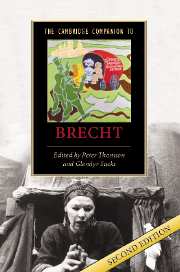Book contents
- Frontmatter
- Part I Context and Life
- Part II The Plays
- 4 Brecht’s early plays
- 5 The Threepenny Opera
- 6 Brecht’s clowns: Man is Man and after
- 7 Learning for a new society: the Lehrstück
- 8 The Good Person of Szechwan
- 9 Mother Courage and Her Children
- 10 Life of Galileo: between contemplation and the command to participate
- 11 The Caucasian Chalk Circle: the view from Europe
- Part III Theories and Practices
- Bibliography
- Index
- Series List
8 - The Good Person of Szechwan
from Part II - The Plays
Published online by Cambridge University Press: 28 March 2007
- Frontmatter
- Part I Context and Life
- Part II The Plays
- 4 Brecht’s early plays
- 5 The Threepenny Opera
- 6 Brecht’s clowns: Man is Man and after
- 7 Learning for a new society: the Lehrstück
- 8 The Good Person of Szechwan
- 9 Mother Courage and Her Children
- 10 Life of Galileo: between contemplation and the command to participate
- 11 The Caucasian Chalk Circle: the view from Europe
- Part III Theories and Practices
- Bibliography
- Index
- Series List
Summary
the woman (shaken[after Shui Ta informs the spongers that they must leave Shen Teh's tobacco shop]) And we thought she was such a good person.
first god: . . . What has business to do with an upright and honourable life?
In Brecht's Lehrstück, The Measures Taken, the Young Comrade is shot and cast into the lime pit by his revolutionary comrades, the Four Agitators. His crime: endangering the revolution by taking pity on the oppressed. The accusation is that he, by such ameliorative actions, may allow a politically corrupt society to preserve itself and thus maintain the status quo, the very status quo that the revolution seeks to overthrow. In other words, he is executed for endangering the revolution by attempting to be 'good'. There is no such didactic imperative at the heart of The Good Person of Szechwan, but there is a dialectical dilemma when the Three Gods in their search for a 'good person' in a world they see as wicked find that person in Shen Teh, leaving her with the ethical imperative 'to be good!' in that world.
The play's narratives, according to the generally accepted text (there is an alternative text - the Santa Monica version - to which reference will be made) follow thus. In order to justify their existence, three eminent gods descend from heaven looking for a good person.
- Type
- Chapter
- Information
- The Cambridge Companion to Brecht , pp. 118 - 131Publisher: Cambridge University PressPrint publication year: 2006

